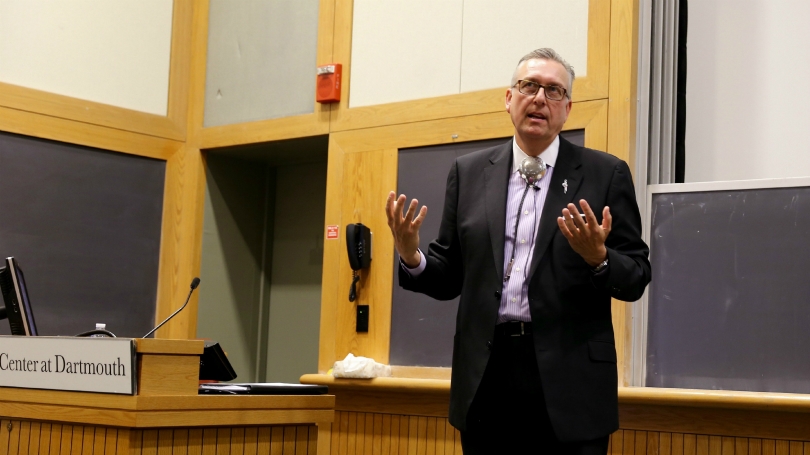
- Public Policy
- Leadership
- Funding
- News & Events
- About the Center
Back to Top Nav
Back to Top Nav
Back to Top Nav
Back to Top Nav
Robert Odawi Porter is an innovative and results-driven attorney, scholar and political leader who has devoted his professional career to advancing the rights of sovereign American Indian nations and tribes in the United States. Currently, he represents tribal governments, organizations, and businesses in Washington, D.C. at Dentons, the world’s largest law firm. Porter gave the Thurlow M. Gordon 1906 Lecture, “Indigenous Peoples, Economic Recovery, and the Reform of U.S. Federal Indian Law,” on October 8, 2015. Before his talk, Nikita Bakhru ’17 sat down with Mr. Porter for an interview.
Nikita Bakhru (NB): You have devoted much of your professional career to advancing the rights of sovereign nations and tribes in the United States. What inspired your interest in American Indian Law?
Robert Odawi Porter (RP): I’m a citizen of the Seneca Nation - I grew up on our tribal land in Western New York. Government service and tribal politics were a part of my family tradition. When I was in college at Syracuse, I had some great professors who helped me gravitate toward understanding how society worked and, since I was really interested in working for my tribe in some capacity, I was drawn to law because I thought it could help me understand how power and economics influenced how my tribe had gotten to where we are today. When I was growing up, I learned about how the United States seized 10,000 acres of my nation’s land – about one-third of the land we had reserved for us by treaty in 1794. The State of New York was also attempting to stop the tobacco trade – a source of jobs that have never been there before. Over the years, we fought a battle over treaty rights and eventually I thought law was my way to contribute.
NB: After graduating from Harvard Law School, you served two terms as Seneca chief legal counsel. How would you describe your role as an attorney?
RP: I’m not a courtroom lawyer – I don’t litigate. I lobby on behalf of my tribal clients. I mainly work with members of Congress and the administration on different issues that affect them. I worked with several different facets of legal and governing strategy, and a lot of my job includes offering advice to the final decision makers and administrators.
NB: After serving as Seneca chief legal counsel and as founding chairman of Seneca Holdings LLC, you were elected as the Seneca Nation’s 67th President. How did you arrive at the decision to take on this leadership challenge?
RP: It was quite an exciting experience. I had been tribal attorney for my nation twice before I ran for office. Before that, I was a law professor for about a dozen years and finally I felt the time was right. I wanted to make a change in my nation. My wife is also a member of the Seneca Nation and after we discussed the possibility of me becoming president with our family and friends, we all decided it was worth a shot. I had envisioned several changes about how our government could improve its operations and this was the opportunity to act. Before me, we had never had a president who had had a college education, much less one who was a lawyer. It was a new thing for all of us when I ran, and I was honored to be elected in the fall of 2010.
NB: What were some of the most rewarding or difficult issues you tackled as the Seneca Nation’s President?
RP: One issue I was particularly invested in was cultural preservation. I worked to devote more resources to Seneca language education and tried to focus on the future of our nation more than past leaders may have. I noticed that our budget has been a matter of public discussion like it is in every community. I thought we had to save more money and focus on our money in terms of supporting younger people, for example by creating more educational opportunities. I fought for more transparency and honesty in business practices, and some people did not agree with my outlook. But, I believe that the trajectory of human history is one of hopeful intellectual and personal strengthening, and I believe that is true for Seneca people in particular. What was rewarding was the change I saw in my nation. Many people said that after I was elected, a college education became more of an acknowledged credential within the community.
NB: Is there a particular experience or success story that has motivated you over the years you’ve dedicated to your nation?
RP: We are a free people as best as I can attest to – we fight as we are a warrior nation and we have had some legendary battles to protect our treaty rights and sovereignty. When I was 28, the State had succeeded in completely cutting off our tobacco trade. The people around me were infuriated by this embargo and by how our economic activity was stopped by the state. But we fought and we won. It really affected me to see the tremendous power of our nation and still motivates me to this day.
-Written by Niki Bakhru '17, Rockefeller Center Student Program Assistant for Communications and Student Outreach